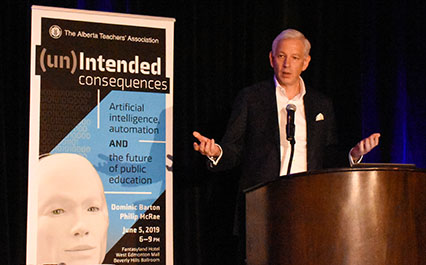Page Content
Teachers will be in high demand due to societal need for retraining
 |
|
Author and management consultant Dominic Barton talks about the potential implications of
artificial intelligence during a talk at the Fantasyland Hotel in Edmonton on June 5.
|
In a future that is approaching more quickly than we can fathom, many jobs that currently exist will be automated, but high demand for reskilling will mean an increased demand for teachers.
This message was part of a technology talk delivered by Dominic Barton — author, internationally renowned business leader and strategic advisor.
“The scale of what we’re going through now is something that we haven’t seen in 500 years — it is a massive amount of change,” Barton said in reference to a fundamental economic and social transformation that is taking place globally.
Hosted by the Alberta Teachers’ Association and its Educational Technology Council, the June 5 talk was entitled (un)Intended Consequences: Artificial Intelligence, Automation and the Future of Public Education.
Technology is at the centre of the change the world is currently experiencing, Barton said.
|
Some experts predict that human-level artificial intelligence (AI) will be a reality by 2029. Barton doesn’t think this level of AI will happen that quickly — he suggested that humans tend to overestimate the speed of impending change but underestimate the scale.
“Every single job is going to be affected by automation,” he said.
Increased automation will eliminate some jobs but will also increase the number of other jobs, although we have no idea what these new jobs might be, Barton said.
|
Education is the “game changer.”
|
What is clear is that AI and automation will profoundly change the way people work and what jobs exist. This, in turn, will require us to learn continually, he said.
“Lifelong learning is one of the biggest changes that we’re going to have to get ready for and it’s happening at a speed that we’re not prepared for as a country,” Barton said.
Given this, education is the “game changer,” Barton suggested.
He said it will be necessary to develop an education system for people aged 25 to 85, but also to fundamentally review how we handle K–12 education.
“If every other organization has to look at things, we have to challenge our orthodoxies.”
One mindset the education world would be wise to avoid is to view education as job training, he said.
“What are we teaching people for? Because if we’re teaching people for a job, I’m not so sure that job is going to be there,” Barton said.
The future will bring an increased demand for teachers, as people seek to retrain for new jobs throughout their lives. In this future, “softer” skills like creativity, communication and teaching will become the most important.
“I think we’re only in the early beginnings or the early chapters of a 100-chapter book,” Barton said. “We haven’t seen anything yet.” ❚
